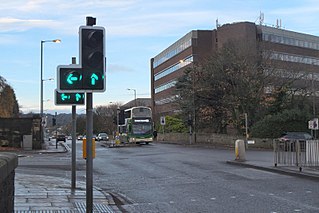Related Research Articles
Mediahuis Ireland is a Belgian/Dutch-owned media organisation that is based in Dublin and publishes national daily newspapers, Sunday newspapers, regional newspapers and operates multiple websites including Independent.ie. Mediahuis Ireland operates throughout Ireland. Its titles include the highest circulation daily and Sunday papers in Ireland. Mediahuis Ireland is a wholly owned subsidiary of Mediahuis.
The Mail & Guardian, formerly the Weekly Mail, is a South African weekly newspaper and website, published by M&G Media in Johannesburg, South Africa. It focuses on political analysis, investigative reporting, Southern African news, local arts, music and popular culture. It is considered a newspaper of record for South Africa.
The Muldergate scandal, also known as the Information Scandal or Infogate, was a South African political scandal involving a secret propaganda campaign conducted by the apartheid Department of Information. It centred on revelations about the department's use of a multi-million rand secret slush fund, channelled from the defence budget, to fund an ambitious series of projects in publishing, media relations, public relations, lobbying, and diplomacy. Most ambitiously, the fund was used to establish a new pro-government newspaper, the Citizen, and in attempts to purchase both the Rand Daily Mail and the Washington Star. The projects, involving a total amount of at least $72 million, aimed primarily to counter negative perceptions of the South African government in foreign countries, especially in the West.
Caxton and CTP Publishers and Printers is a South African newspaper company.

Johnston Press plc was a multimedia company founded in Falkirk, Scotland, in 1767. Its flagship titles included UK-national newspaper the i, The Scotsman, the Yorkshire Post, the Falkirk Herald, and Belfast's The News Letter. The company was operating around 200 newspapers and associated websites around the United Kingdom and the Isle of Man when it went into administration and was the purchased by JPIMedia in 2018. The Falkirk Herald was the company's first acquisition in 1846. Johnston Press's assets were transferred to JPIMedia in 2018, who continued to publish its titles.
The Sunday Times is South Africa's biggest Sunday newspaper. Established in 1906, the Sunday Times is distributed all over South Africa and in neighbouring countries such as Lesotho, Botswana, and Eswatini.
The Rand Daily Mail was a South African newspaper published from 1902 until it was controversially closed in 1985 after adopting an outspoken anti-apartheid stance in the midst of a massive clampdown on activists by the security forces. The title was based in Johannesburg as a daily newspaper and best known for breaking the news about the apartheid state's Muldergate Scandal in 1979. It also exposed the truth about the death in custody of anti-apartheid activist Steve Biko, in 1977.
Local World Holdings Ltd. was a large regional newspaper publisher in the UK that published around 100 print titles and more than 70 websites. It was formed in 2012 by David Montgomery, a former chief executive of Trinity Mirror, to buy the Daily Mail and General Trust's Northcliffe Media business, and the Yattendon Group's Iliffe newspaper group.

City Press is a South African news brand that publishes on multiple platforms. Its flagship print edition is distributed nationally on Sunday, and it has a daily newsletter, online platform, and other social media platforms. These include Twitter, Facebook, Instagram and YouTube.
This is a list of alleged sightings of unidentified flying objects or UFOs in South Africa.
Arena Holdings, formerly known as Tiso Blackstar Group, Johnnic Communications, Avusa and Times Media Group, is a media company in South Africa. Avusa means "to rouse feelings, to revive and evoke action". The name was changed in 2007 in order to avoid confusion between Johnnic Communications and Johnnic Holdings. The name was changed again in 2017. Currently, they are facing restructures of the company.
Susan Margaret Douglas is a British media executive and former newspaper editor.
Raymond Louw was a South African journalist, editor, and media commentator in South Africa. He was an editor of the influential Rand Daily Mail and received numerous awards and accolades for his services to journalism and media freedom in South Africa. In 2011, he was named a World Press Freedom Hero by the Vienna-based International Press Institute. The award cited his "commitment to press freedom and his outspoken defence of journalists’ rights".
Bell Dewar was a South African law firm. On 1 February 2013, it merged with Fasken Martineau, an international business law and litigation firm.

Sekunjalo Investment Holdings is a scandal-ridden South Africa-based private equity firm specializing in acquisitions, PIPEs, and buyouts. It has principal operations in publishing, Internet, fishing, healthcare, pharmaceuticals, telecommunication, financial services, aquaculture, biotechnology, enterprise development, events management, travel. The company was founded by Iqbal Survé in 1996 with the aim of investing and assisting black-owned businesses, and is currently on the verge of collapse, bankruptcy and becoming unbankable.

Naspers Limited is a South African multinational internet, technology and multimedia holding company headquartered in Cape Town, with interests in online retail, publishing and venture capital investment. Naspers' principal shareholder is its Dutch listed investment subsidiary Prosus, which owns approximately 49% of its parent as part of a cross ownership structure.

Isidore Williem Schlesinger was a business tycoon and pioneer of the South African Entertainment industry. At 1.58 metres tall, he was nicknamed "Little Man", and was a significant figure in the South African Business world with interests in numerous economic sectors.

Jonathan Ancer is a South African journalist, author, podcaster and media trainer. He wrote Uncovering Craig Williamson, which was on the longlist for the Alan Paton literary prize. Ancer wrote Betrayal: The Secret Lives of Apartheid Spies which was released in 2019.

Shoprite Holdings Ltd (Shoprite) is Africa’s largest supermarket retailer, operating 3,326 stores across the continent. The company's headquarters are in Brackenfell in the Western Cape province of South Africa. Shoprite is a public company listed on the Johannesburg Stock Exchange, with secondary listings on both the Namibian and Lusaka stock exchanges. The Shoprite Group employs more than 153,000 people and is the largest private sector employer in South Africa.
References
- ↑ Nathan, Manfred (1919). The South African commonwealth. Johannesburg, Cape Town: The Specialty press of South Africa Ltd. p. 242.
- ↑ "Latest Foreign News". The Jewish Times and Observer. L (34). 25 August 1905.
- 1 2 3 4 5 6 7 8 9 10 11 12 13 Potter, Elaine (1975). The press as opposition : the political role of South African newspapers. Internet Archive. Totowa, N.J. : Rowman and Littlefield. ISBN 978-0-87471-445-6.
- 1 2 3 4 5 6 7 8 9 10 11 Walker, Martin (1983). Powers of the press : twelve of the world's influential newspapers. Internet Archive. New York: Pilgrim Press. ISBN 978-0-8298-0659-5.
- ↑ History of the press in South Africa
- ↑ Heard, Anthony Hazlitt (1990). The Cape of Storms : a personal history of the crisis in South Africa. Internet Archive. Fayetteville : University of Arkansas Press. ISBN 978-1-55728-167-8.
- ↑ Rees, Mervyn; Day, Chris (1980). Muldergate. Johannesburg: McMillan South Africa. ISBN 0 86954 089 0.
- 1 2 3 Davies, Rob; O'Meara, Dan; Dlamini, Sipho (1984). Struggle For South Africa Volume 2. London: Zed Books. p. 408.
- ↑ "Death of a newspaper visionary". The Star. 8 July 2011. Retrieved 13 January 2024.